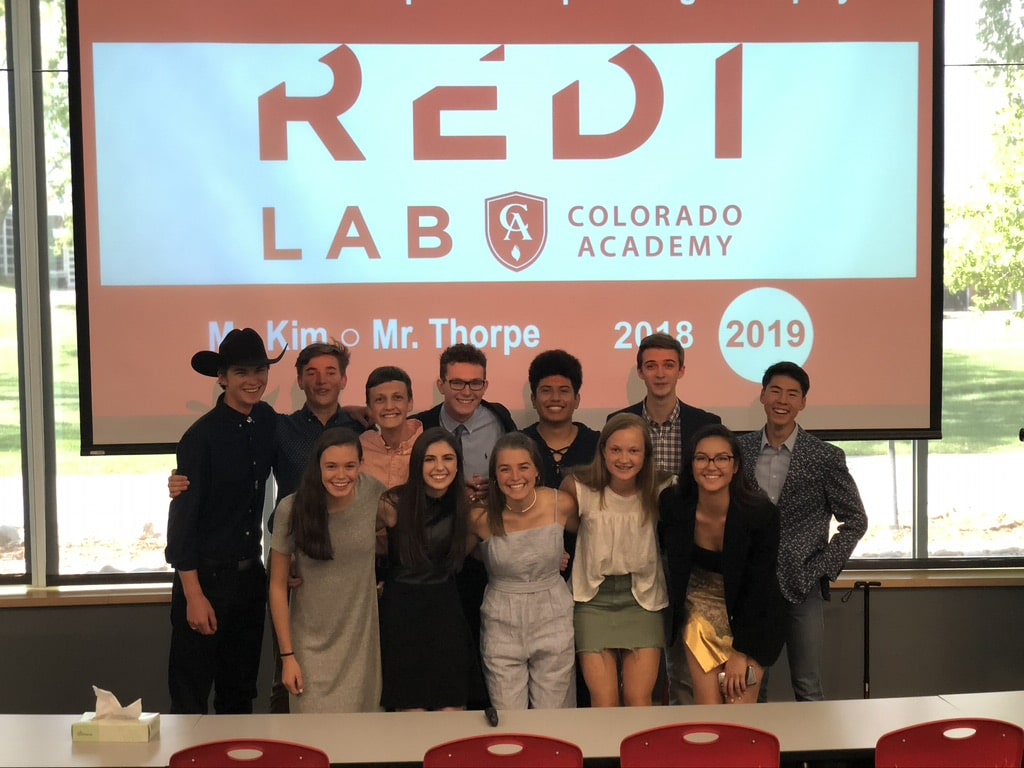In today’s fast-paced world, the traditional education model often feels outdated and stifling for both students and teachers because compliance and performance are the primary goals for achievement. Students – and all humans for that matter – are eager to learn, so we find ourselves seeking more opportunities for agency and how we might integrate more of our identity into our work.
As an English teacher, when I taught grammar, administered a vocabulary quiz, or modeled how to write a better 5-paragraph essay, students would challenge me by asking: “What’s the point?” Teaching methods that prioritize memorization and test scores often foster an antagonistic teacher-student dynamic. As an antidote I asked students to be creative, take risks, or work through open-ended questions. Without prior experience or permission to practice these skills, students typically struggled and gave up. It felt as if we were at an impasse.
This is where the REDI Lab stands as an example and a proven model of what education can truly be when students and educators embrace new mindsets to unlock optimism and possibilities inspiring fearless innovation. At the core of the REDI Lab model is the understanding that “Agency may be the one most important factor in human happiness and well-being,” (Stixrud & Johnson, The Self-Driven Child).
Imagine a classroom where students aren’t just passive recipients of information but active creators of knowledge. In the REDI Lab, this vision comes to life so that students are encouraged to pursue their passions and tackle real-world challenges. Whether it’s designing solutions to public transportation in Denver; writing, recording, and “publishing” an original album; or launching a mental health awareness campaign, students are empowered to ask, ‘What do I want to explore?’, ‘What am I uniquely qualified to do?’, and ‘Why do I want to do this?’ This shift transforms their learning experience from mundane to meaningful, fostering not only confidence but also critical problem-solving skills.
The impact of this approach extends beyond the students themselves; it also invigorates teachers who are given the freedom to rethink their teaching methods, specifically aligning the goals and outcomes with the feedback and growth opportunities that students are given. In other words, assessment is reframed from grading to feedback. The term assessment has roots in the French verb s’asseoir, “to sit next to”, or the Latin verb assidere, “to sit beside or with”, and its meaning is intended to describe a dynamic where teachers work with and for the students. The REDI Lab transforms assessment into what it should be—a platform where students author their own narratives instead of having their stories dictated by others.
In the REDI Lab, educators collaborate with students on projects that blend subjects and encourage creativity. For instance, a teacher might team up with students to create a campaign or a short documentary about local history, turning lessons into engaging narratives that enact change in their community. This kind of innovation reignites teachers’ passion for their work, brings fresh ideas to the surface, and creates a dynamic classroom environment where everyone thrives.
Moreover, what REDI Lab participants feel most acutely is a commitment to collaboration and building community. At any given time, an observer will see a community where students and teachers work side by side, sharing ideas and providing constructive feedback. In this environment, risk-taking is encouraged—students learn that failure is not the end but rather a stepping stone toward success. When they pitch their ideas and receive feedback, they refine their concepts and grow in confidence. This collaborative spirit is essential; it mirrors the teamwork needed in our increasingly interconnected world.
The REDI Lab’s approach represents a vital shift in how we think about education. It challenges schools to reconsider what it means to truly prepare students for the future. Now more than ever, it is crucial that schools provide opportunities for both students and educators to focus on real-world applications and nurture creativity. By equipping young people with essential skills like critical thinking, collaboration, and resilience, we can empower the next generation to thrive. Educational models that prioritize student agency and foster an inclusive environment where every voice is heard hold the key to a brighter future. Our work with over 350 students and 200 teachers has proven that when education embraces fearless innovation, the potential for transformation is limitless.
Ultimately, we know that schools and education are an optimistic wager that let us rally behind this vision—one where our schools are not just places of learning but incubators of creativity and change. How do we know this? Most immediately if we consider how schools shifted practically overnight from in-person to remote teaching and learning during the COVID Pandemic, we can rest assured that change is possible.
Through our newsletters, new website, and increased community engagement, the REDI Lab aims to instill a sense of optimism and possibility in students and teachers alike – ultimately fostering an environment where everyone knows they have ideas inside of them that are worth exploring and sharing. The REDI Lab is proof that when we enable both students and teachers, we unlock their limitless potential.

